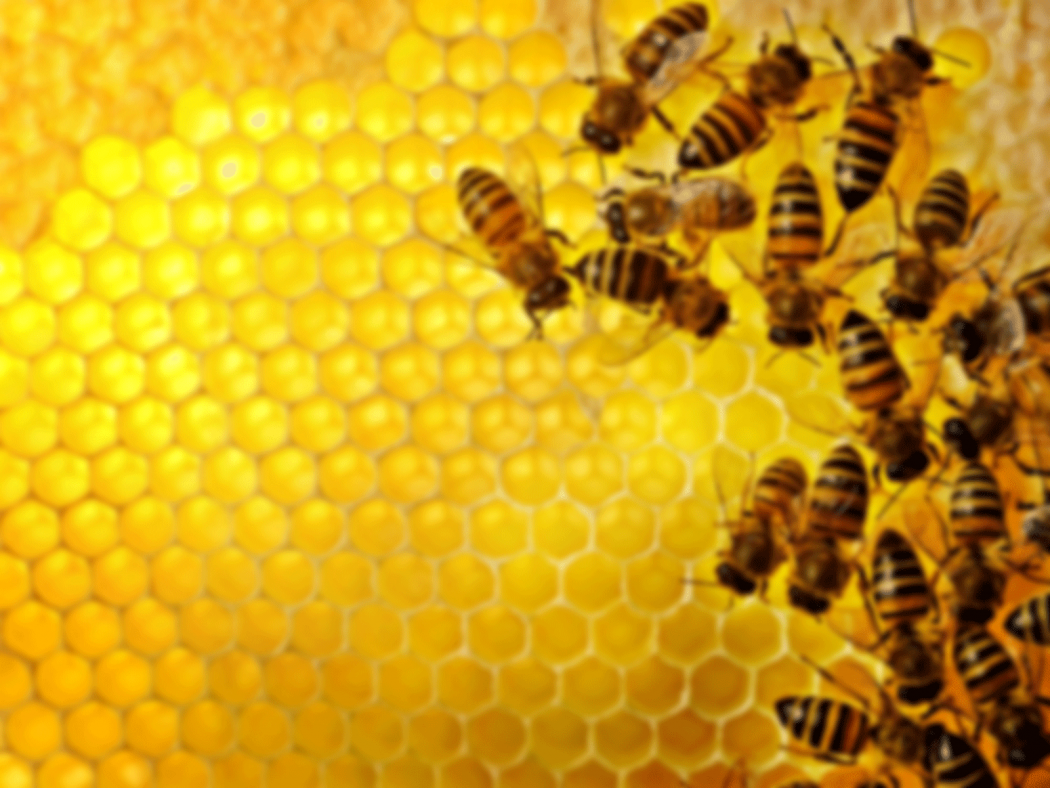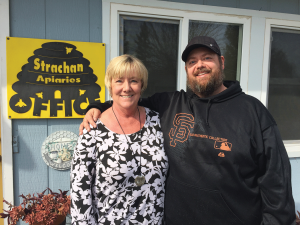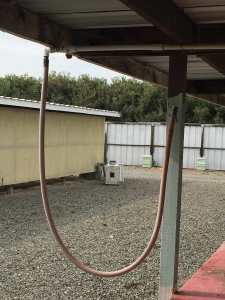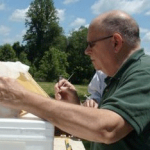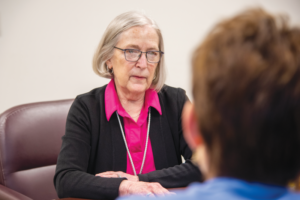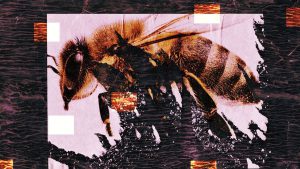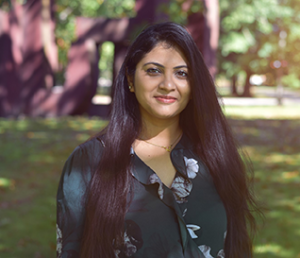By: Larry Connor
An Interview with Valeri Strachan.
LC – Tell me how you found yourself running a queen business in California?
VS – Long story . . . As a single mom of two boys I was trying to make a living as a hairdresser and going to college taking business classes. During that time my dad’s bee business was growing and he was having difficulty keeping the books in order. I started doing his bookkeeping and also gained practical training at an accountancy firm. After a year in the office I became interested in the workings of the business and asked if I could learn more about the beekeeping and continue doing bookkeeping. He sent me to raise queens with the then all male queen crew grafting, raising cells, and caging queens. This was in 1976 and all our employees were men. My passion for the bees grew and I found myself working seven days a week in the Spring raising queens and continuing office work when time allowed. By then I talked my dad into hiring someone to work in the office.
I was creative and a little pushy and I created my position in our company from the beginning. I was determined to learn about bees and queens. I think the business could have been sold but my dad said to me he was “waiting to see if I was serious.” My dad passed away in 2003 15 months after my mom died. The year prior to my mom’s death he let go of most business dealings. This was the year I was California State Beekeeper’s president so it was a difficult time in my life.
LC – You are one of a few women running a beekeeping business, and certainly one of a very few running a queen production business with the size and scope of yours. What have been the biggest challenges you have faced in running a bee business, and how has any gender inequality interfered with your ability to get things done? Has gender ever opened a door that might be closed to a man?
VS – I believe if I were a man it might have been easier for me but probably not for my dad. He was from the “greatest generation” and if I were a son we probably would have butted heads more than we did. Being female immediately puts you in another class among associates in business, especially for me in the beginning. Even today I rarely have male friends in this business call or want to “hang out” like they do with their male counterparts in the trade. That is definitely a male/female gender inequality that I actually understand though I miss out on their gossip. So, to overcome those inequities I tried to think like a man and forced myself to make the contacts, talk mostly about business, and discuss the needs of customers. It’s much more acceptable now for a woman to run and own a multi-million dollar business. It’s still pretty rare in most agricultural businesses but the women making strides are thinkers and more secure in themselves. It’s not “Mad Men” thinking any more.
I feel the attitude of not giving up had to be prevalent in all of my thinking. I had been my dad’s right hand gal since 1975 so many of his contacts I already knew. My employees knew me and were extremely helpful and wanted the business to continue and be successful. I don’t want to paint a picture of it being perfect because it wasn’t. There are struggles dealing with employees, customers, government, bee diseases, encroaching beekeepers, accidents, and so many things it would fill a page or two.
LC – You are working with Sue Cobey to maintain pure New World Carniolan queens in your production colonies and for sale. Tell us how you obtained stock from Sue, how you maintain the stock, and what unique challenges you have had with this program.
VS – Sue was my mentor and taught me a lot of what she knew of instrumental insemination and breeding. When she and Tim lived in Vacaville, CA we became acquainted and we purchased Carniolan stock from them. We’ve kept that connection ever since and she and I probably have a unique attachment to the NWC bees. I’m very proud of our success with the NWC stock. My early training and determination to learn the breeding and maintaining stock through instrumental insemination has put our product among the very best in the U.S. and Canada. The only challenge will be the future of the program. I will continue to do the I.I. of the NWC stock a few more years. I’m hoping that Sue and I will be able to train someone to continue with the effort we’ve put into the program.
LC – How have you structured your business? Since your son works with you, have you separated responsibilities into smaller operations or do the two of you pull the burden together? Who else is essential to the operation of Strachan Apiaries Inc.?
VS – Yes, so happy to have family involved in the business. Philip (son) began working in the business January, 2010 and wished he’d started years before. It was different from the extracting and building boxes that he used to do as a teenager. We kind of have a chain of command as far as structure goes. I have a field manager whom I’ve worked with since 1985 and he is mentoring Philip. We also have other managers and crew leaders that oversee the different field and office operations. But I still check on everything. I’m fortunate to have employees that have been with us well over 20 years.
LC – You explained that you instrumentally inseminate about 200 Carniolan breeder queens every June. How do you organize this? Do you have help with the insemination? Do you evaluate the new queens in nuclei or in full-sized colonies? What testing are you doing on these queens?
VS – Since I don’t have a lab we turn our queen raising building into one the week after we complete the last graft which is usually the first of June. The nucs are still full of queens though. Once the queens are established and have adequate brood and bees we evaluate them and do hygienic testing. They are full size colonies by then. There is a list of character traits we look for in the Fall and again in the Spring before we determine the best. We rate them on temper, brood viability, pollen collecting, and honey stores. They’re checked for any disease or poor quality of any kind including color.
I usually do the insemination myself. I have exchanged stock with Sue Cobey and am still involved in breeding the NWC with her. In recent years I’ve had help from Liz Frost one year and Kim Fondrk a couple of times working beside me which makes the work go faster.
LC – What’s your favorite story about helping beekeepers improve their operations by using your stock? Have your efforts to develop increased hygienic behavior in the stock been accepted by the beekeeping industry as an important step in reducing the frequency of mite treatments?
VS – I have several queen producers buy breeder’s from me so they can sell the Carniolan queens. These producers use and sell mostly Italian queens in their operations where we only use the NWC stock. This year a customer shared that the packages and queens he got from us were unbelievable how they grew and produced honey. We receive accolades from many customers stating their success. I can’t tell anyone not to treat for mites but there are some who say they don’t treat as often. It all depends on where the bees live and how close another apiary is. A few people will seek me out at conventions to let me know how much they appreciate what we do and the care we put into our product. The fact that we can’t raise enough queens to supply demand says something about our efforts. The hygienic behavior is important for more than mite control. There’s practically no chalk brood and extremely little evidence of any AFB and EFB. We’ve burned AFB hives so now we see it so rarely it surprises us. We almost never use Tylan.
LC – What are you reading for enjoyment?
VS – Sounds like a personal question . . . I’m currently reading the Bill O’Reilly books. I read Killing Kennedy and started the Killing Lincoln and Killing Reagan books. The history is interesting to me. I read newspapers daily, bee journals, ag. alert, etc. and I study the Bible weekly.
Visit with Valeri and Larry at the Big Meeting in Galveston, TX in January. And check the books at http://www.wicwas.com.




